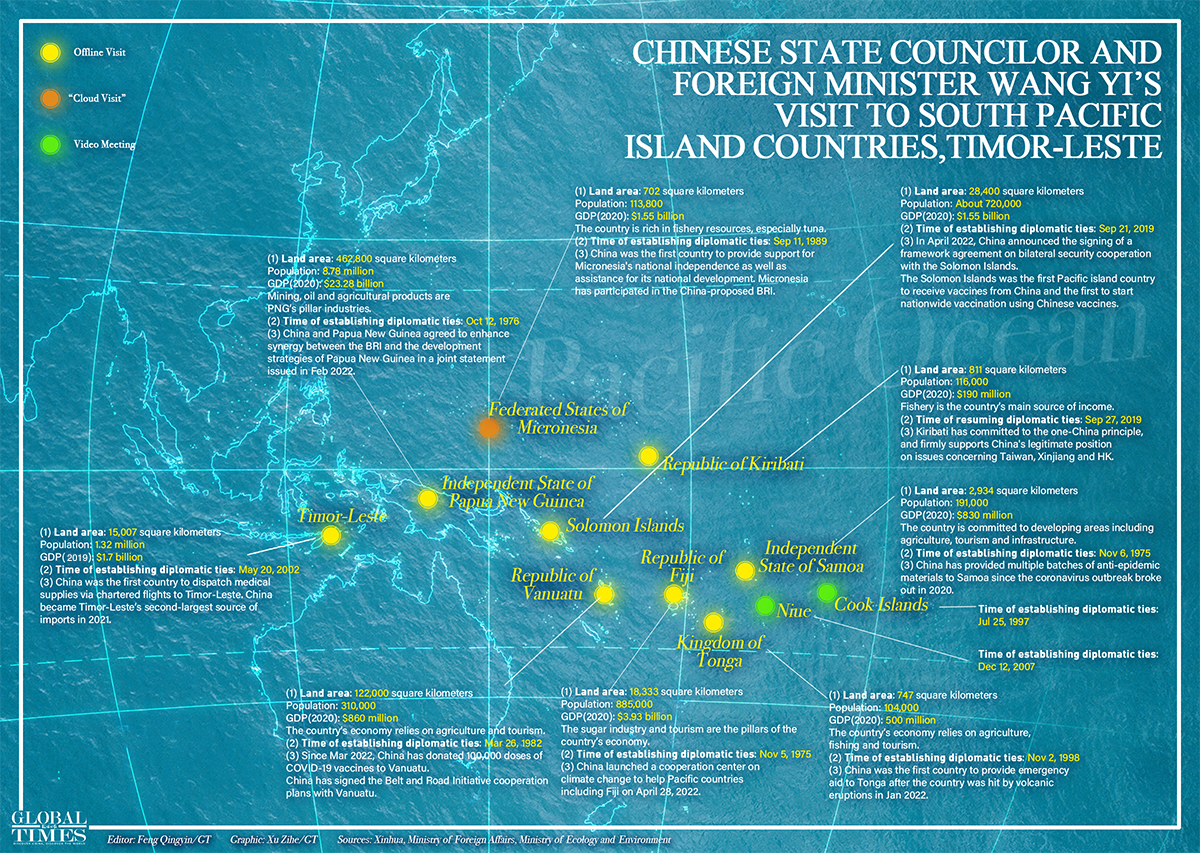
Chinese State Councilor and Foreign Minister Wang Yi’s visit to South Pacific island countries, Timor-Leste Editor: Feng Qingyin/GT Graphic: Xu Zihe/GT
Chinese State Councilor and Foreign Minister Wang Yi called on developing countries to treat others equally, help each other, and focus on development, as he summarized three keywords on how China develops friendly relations with other countries, including the South Pacific countries, at a joint press conference with Foreign Minister Soroi Eoe of Papua New Guinea, concluding a 10-day visit to the South Pacific.
Wang also urged Australia to improve relations with China and stop seeing China as an adversary.
The first keyword is "Treat others as equals." Wang said China treats every country equally, especially smaller countries. Given its own experience in history, China fully understands the value and importance of "equality" for developing countries, especially small and medium-sized countries. Unlike some other major powers, China will never start "from a position of strength" or keep talking about being a world leader during exchanges with other countries.
Wang noted that international relations should be democratized, and world affairs should be handled through consultation by all countries. What regulates the democratization should only be the purposes and principles of the UN Charter and universally recognized international laws, rather than the so-called rules formulated by a certain major country or a small number of countries on their own.
The second key word is "Help each other." Wang noted that developing countries, especially small and medium-sized countries, are weak in international status and can hardly have their voice heard. In order to safeguard developing countries' common interests and small and medium-sized countries' legitimate rights to development, developing countries must help and support each other, unify and amplify their voices, coordinate and strengthen their common positions, and firmly and consistently oppose all bullying and hegemons. In doing so, the world will gradually become more balanced and truly harmonious.
The third key word is "Focus on development." Wang said that development, revitalization, improvement of people's livelihood and increase of national strength are the common mission and urgent task of all developing countries as well as small and medium-sized countries. The 21st century is the time for developing countries to thrive.
Wang pointed out that deepening economic and trade cooperation should be the theme and goal of developing countries, who should jointly remove all obstacles that hinder them from accelerating development.
At the same time, Wang said developing countries call on Western countries to increase input and support for development and refrain from being paranoid about geopolitical competition or using smaller countries as pawns for political exploitation.
Wang said that, with an inclusive attitude, China is always ready to carry out trilateral or multilateral cooperation with developed countries that are willing to cooperate in Pacific Island countries and other developing countries to achieve all-win and win-win outcomes.
He stressed that China's diplomacy is different from that of conventional major powers. What China hopes to achieve is common development and rejuvenation with other developing countries; and that China promotes major-country diplomacy with Chinese characteristics; what China strives for is building a community with a shared future for mankind.
On the occasion, Wang also talked about the future prospect of China-Australia relations.
Wang said the crux of the difficulties in China-Australia relations in recent years lies in the fact that some political forces in Australia are determined to see China as an adversary rather than a partner and portray China's development as a threat rather than an opportunity. This has led to a significant reversal of Australia's previous positive and pragmatic policy toward China.
According to Wang, the solution to the problem is that Australia should view China and its relations with China rationally and positively, respect China and seek common ground while putting aside differences, creating necessary conditions for the two countries' relations to return to the right track.
Wang stressed that there is no "autopilot" mode for China-Australia relations. Concrete actions are needed to reset bilateral ties. This conforms to the aspirations of the two peoples and the trend of the times.
Global Times




